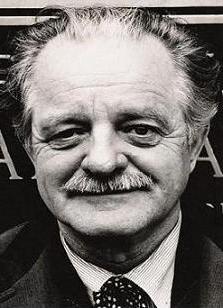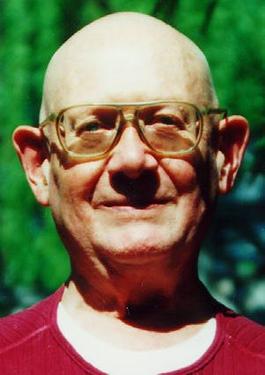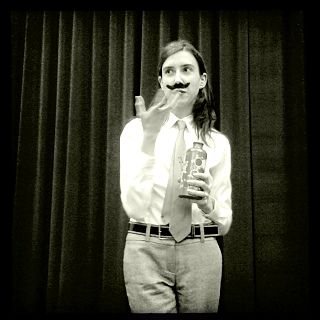Related Research Articles

Kenneth Charles Marion Rexroth was an American poet, translator, and critical essayist. He is regarded as a central figure in the San Francisco Renaissance, and paved the groundwork for the movement. Although he did not consider himself to be a Beat poet, and disliked the association, he was dubbed the "Father of the Beats" by Time magazine. Largely self-educated, Rexroth learned several languages and translated poems from Chinese, French, Spanish, and Japanese.

Sir Geoffrey William Hill, FRSL was an English poet, professor emeritus of English literature and religion, and former co-director of the Editorial Institute, at Boston University. Hill has been considered to be among the most distinguished poets of his generation and was called the "greatest living poet in the English language." From 2010 to 2015 he held the position of Professor of Poetry in the University of Oxford. Following his receiving the Truman Capote Award for Literary Criticism in 2009 for his Collected Critical Writings, and the publication of Broken Hierarchies , Hill is recognised as one of the principal contributors to poetry and criticism in the 20th and 21st centuries.

Philip Glenn Whalen was an American poet, Zen Buddhist, and a key figure in the San Francisco Renaissance and close to the Beat generation.
The Dharma Bums is a 1958 novel by Beat Generation author Jack Kerouac. The basis for the novel's semi-fictional accounts are events occurring years after the events of On the Road. The main characters are the narrator Ray Smith, based on Kerouac, and Japhy Ryder, based on the poet and essayist Gary Snyder, who was instrumental in Kerouac's introduction to Buddhism in the mid-1950s.
İlhan Berk was a leading Turkish poet. He was a dominant figure in the postmodern current in Turkish poetry and was very influential among Turkish literary circles.

Mary Jane Oliver was an American poet who won the National Book Award and the Pulitzer Prize. She found inspiration for her work in nature and had a lifelong habit of solitary walks in the wild. Her poetry is characterized by wonderment at the natural environment, vivid imagery, and unadorned language. In 2007, she was declared the best-selling poet in the United States.
Nathaniel Tarn was a French-American poet, essayist, anthropologist, and translator. He was born Edward Michael Mendelson in Paris to a French-Romanian mother and a British-Lithuanian father. He lived in Paris, France, until the age of seven, then in Belgium until the age of 11; when World War II began, the family moved to England. He emigrated to the United States in 1970 and taught at several American universities, primarily Rutgers, where he was a professor from 1972 until 1985. He has lived outside Santa Fe, New Mexico, since his retirement from Rutgers.
Katia Kapovich is a Russian poet now living in the United States. She writes in both Russian and English.
Nationality words link to articles with information on the nation's poetry or literature.
Mary Cennamo Robison is an American short story writer and novelist. She has published four collections of stories, and four novels, including her 2001 novel Why Did I Ever, winner of the 2001 Los Angeles Times Book Prize for fiction. Her most recent novel, released in 2009, is One D.O.A., One on the Way. She has been categorized as a founding "minimalist" writer along with authors such as Amy Hempel, Frederick Barthelme, and Raymond Carver. In 2009, she won the Rea Award for the Short Story.
Geoffrey Brock is an American poet and translator. Since 2006 he has taught creative writing and literary translation at the University of Arkansas, where he is Distinguished Professor of English.

Kathleen Rooney is an American writer, publisher, editor, and educator.
Alfred Corn is an American poet and essayist.
Peter John Rose is an Australian poet, memoirist, critic, novelist and editor. For many years he was an academic publisher. Since 2001 he has been editor of Australian Book Review.
David Hinton is an American poet and translator who specializes in Chinese literature and poetry.
Terry Randolph Hummer is an American poet, critic, essayist, editor, and professor. His most recent books of poetry are After the Afterlife and the three linked volumes Ephemeron, Skandalon, and Eon. He has published poems in literary journals and magazines including The New Yorker, Harper's, Atlantic Monthly, The Literati Quarterly, Paris Review, and Georgia Review. His honors include a Guggenheim Fellowship inclusion in the 1995 edition of Best American Poetry, the Hanes Prize for Poetry, the Richard Wright Award for Literary Excellence, and three Pushcart Prizes.
Albert Mobilio is an American poet and critic. He teaches at Eugene Lang College, the liberal arts college of The New School university. His work appears in Bomb, Salon, Postmodern Culture, Harper's. He is an editor of Hyperallergic and is a former editor of Bookforum.

William Roorbach is an American novelist, short story and nature writer, memoirist, journalist, blogger and critic. He has authored fiction and nonfiction works including Big Bend, which won the Flannery O'Connor Award for Short Fiction and the O. Henry Prize. Roorbach's memoir in nature, Temple Stream, won the Maine Literary Award for Nonfiction, 2005. His novel, Life Among Giants, won the 2013 Maine Literary Award for Fiction.[18] And The Remedy for Love, also a novel, was one of six finalists for the 2014 Kirkus Fiction Prize. His book, The Girl of the Lake, is a short story collection published in June 2017. His most recent novel is Lucky Turtle, published in 2022.

Classical Chinese poetry genres are those genres which typify the traditional Chinese poems written in Classical Chinese. Some of these genres are attested to as early as the publication of the Classic of Poetry, dating from a traditionally, and roughly, estimated time of around 10th–7th century BCE, in what is now China, but at that time was composed of various independent states. The term "genres" refers to various aspects, such as to topic, theme, and subject matter, what similes or metaphors were considered appropriate or how they would be interpreted, and other considerations such as vocabulary and style. These genres were generally, but not always independent of the Classical Chinese poetry forms. Many or most of these forms and genres were developed by the Tang dynasty, and the use and development of Classical Chinese poetry genres actively continued up until the May Fourth Movement, in 1919, and still continues even today in the 21st century.

Will Hermes is an American author, broadcaster, journalist and critic who has written extensively about popular music. He is a longtime contributor to Rolling Stone and to National Public Radio's All Things Considered. His work has also appeared in Pitchfork, Spin, The New York Times, The Village Voice, The Believer, GQ, Salon, Entertainment Weekly, Details, City Pages, The Windy City Times, and Option. He is the author of Love Goes To Buildings On Fire: Five Years in New York That Changed Music Forever (2011), a history of the New York City music scene in the 1970s; and Lou Reed: The King of New York, a biography.
References
- ↑ "Geoffrey O'Brien biography, plus links to book reviews and excerpts". BookBrowse.com. Retrieved October 6, 2014.
- ↑ "Geoffrey O'Brien - The New York Review of Books" . Retrieved October 6, 2014.
- ↑ Review of The Browser's Ecstasy, New York Magazine , May 22, 2000.
- ↑ Menand, Louis, Review of The Phantom Empire, The New Yorker .
- ↑ "Sonata for Jukebox: Music, Pop, Memory, and the Imagined Life by Geoffrey O'Brien". Publishers Weekly .
- ↑ "Early Autumn by Geoffrey O'Brien".
- 1 2 "Jacket 29 - April 2006 - Nathaniel Tarn reviews Red Sky Café by Geoffrey O'Brien".
- ↑ "Geoffrey O'Brien". Archived from the original on October 6, 2014. Retrieved October 6, 2014.